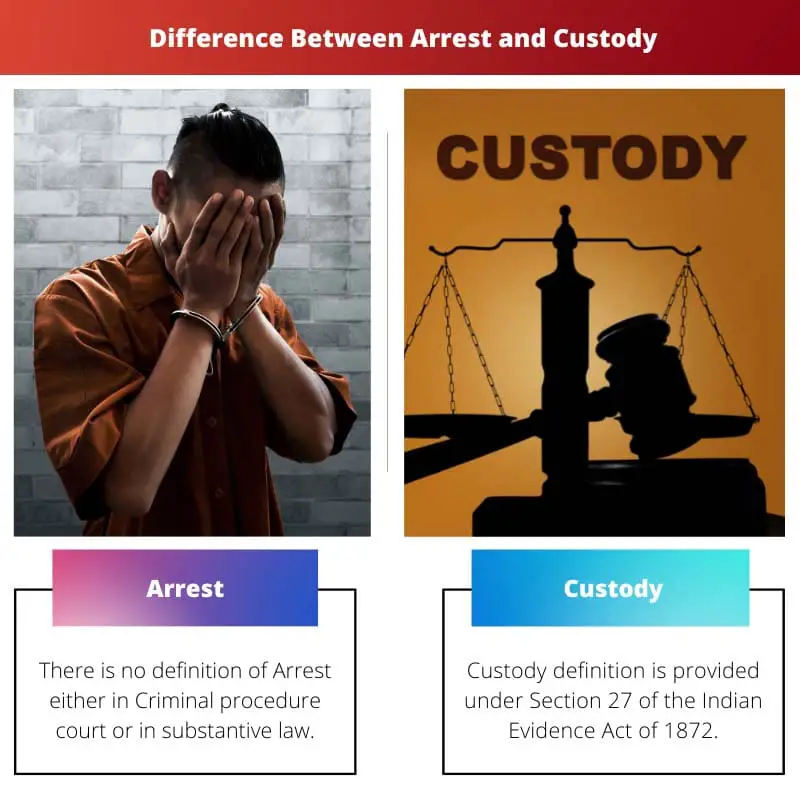The changing world has a different impact on different people; some are changing for the good some are changing for the worst. To be successful or rich in life many people use illegal means or commit criminal activities.
Hence, we have laws and polices department to keep a check on such criminals. There are two terms used by the police when they use to take the criminals to jail i.e. Arrest and Custody.
Although these words appear the same to many people the meaning of these two words is quite different from one other.
Key Takeaways
- Arrest involves detaining a person based on probable cause, while custody refers to holding a person under the control of law enforcement.
- An arrest is a formal process that includes reading rights and potentially handcuffing, while custody can be informal or temporary.
- Custody can follow an arrest or occur during an investigation, while an arrest is a specific action law enforcement takes.
Arrest vs Custody
The difference between Arrest and Custody is that Arrest means apprehending someone and taking them into custody for committing a crime or planning to commit one. On the other hand, The situation of being detained or temporarily imprisoned, particularly by the police, is known as Custody. It is also defined as a legitimate right or obligation to look after someone or an object.

Taking someone into custody or putting them under constraint, to force them to obey the law is called Arrest.
The goal of the constraint if the arrest occurs during prosecution is to detain the person for a response to a criminal offense or to keep him from executing an offensive or criminal activity.
As soon as a person is charged with a crime and held in police custody, they must appear in court for the court to determine whether the individual should remain in Custody.
The police can detain an individual for 24 hours before they have to charge them with a crime or let them free. This whole procedure is known as Custody.
Comparison Table
| Parameters of Comparison | Arrest | Custody |
|---|---|---|
| The definition quoted in the book of the law | There is no definition of Arrest either in Criminal procedure court or in substantive law | Custody definition is provided under Section 27 of the Indian Evidence Act of 1872 |
| Main types | 1)Arrest with a warrant issued by the magistrate 2) Arrest without warrant | 1)Judicial custody 2) Police Custody |
| Derived from | The French word “arrest” means to stop or stay put. | “Guardianship” means keeping and safekeeping |
| Duration | Generally, it or 24 hours until the charge is proved or an individual comes out clean. However, in some circumstances, it can increase up to 36 to 96 hours | 15 days |
| Stage in regards to apprehending an individual | 1st stage | 2nd stage |
What is an Arrest?
An Arrest is an act of taking someone into custody or putting them under restriction to compel them to obey the law.
The goal of the constraint if the Arrest happens during a criminal investigation is to detain the person for an answer to a criminal accusation or to prohibit him from tapering with the evidence.
The goal of civil procedures is to hold a person accountable for demands placed on him.
An Arrest Procedure: An arrest is when someone is taken into custody without their will to charge or question them. It entails the use of physical force or surrendering to an officer’s display of force. The detainee should not be allowed to depart or set free.
“Reasonable man” is used as a standard when determining whether someone should be arrested. You have to see whether a reasonable person in the defendant’s shoes would have concluded that he or she was not free to leave.
When police confront someone in a public spot and ask if they are ready to answer the questioning, the policeman does not make an arrest.
Two types of Arrest are carried out by the police authorities to detain the criminal or suspect, they are as follows:
1) Arrest based on a warrant – An arrest can be undertaken in all warrant proceedings, including in summons cases if it is required to bring the suspect to a court or when there is a breach of an appearance bond, it is believed that the accused is absconding or he or she will not heed the summons.
2) Arrest without warrant: Section 151 gives the power to a police officer can arrest anyone, without a warrant or orders from a magistrate, “if it seems to the officer” that such individual is planning to conduct a crime and that the crime can’t be avoided otherwise.

What is Custody?
Custody refers to the act of just watching or restricting the mobility of the individual in question. Custody is the second phase of the arrest process in criminal law.
If an individual is arrested for any illegal behavior or allegation of a crime, the police are frequently unable to complete the investigation and deliver the individual before the officer within 24 hours.
For the time being, it is vital to keep the individual away from the general public, both for the sake of the public’s safety and the individual’s safety hence the individual is taken into custody.
It’s also critical that he’s present for additional investigation and inquiry, and that he doesn’t try to get around the law.
Custody is an act of an individual or an authority exercising direct charge and control over a child or a criminal. Generally, there are two types of Custody:
Police Custody: The arrest of a suspect is done by the police officer to gather more information about a criminal offense.
Another goal of police custody is to keep evidence from being destroyed. At this time, the arrestee can be interrogated by the officer in authority.
Judicial Custody: When a police officer delivers an apprehended individual before a magistrate, the magistrate has the option of sending him to police custody or judicial custody, as per Section 167(2) of The Code of Criminal Procedure, 1973.
When a Magistrate directs that a person be taken into custody by the police, the police will have bodily possession of the arrestee. The arrestee will be held in police custody and interrogated to obtain the essential details.

Main Differences Between Arrest and Custody
1) An Arrest is the deprivation of a person’s freedom to allegedly investigate or prevent a crime. While the act of taking care of, possessing, and controlling something or someone is Custody.
2) In every Arrest, there is Custody, but for every Custody, there is no Arrest. (For example, if someone commits a crime and directly goes to the magistrate and accepts his/her crime, there is Custody in this scenario but no Arrest. Hence, in every Arrest, there is a Custody but in every Custody, there is no Arrest)
3) Arrest is not defined in the Code of Criminal Procedure Code or Substantive Acts. But the definition of Custody has been defined by the law.
4) The purpose of an Arrest is to prevent the individual from committing a further crime and to stop him from tampering with the evidence, while Custody means to restrict the mobility and facilitate the investigation of a crime of which an individual is suspected.
5) An Arrest is a restriction of a person’s freedom, whereas Custody is the state of being guarded or held in prison for some time, by the police.

- https://onlinelibrary.wiley.com/doi/abs/10.1111/j.1745-9125.1991.tb01089.x
- https://www.sciencedirect.com/science/article/pii/S1752928X10000077
